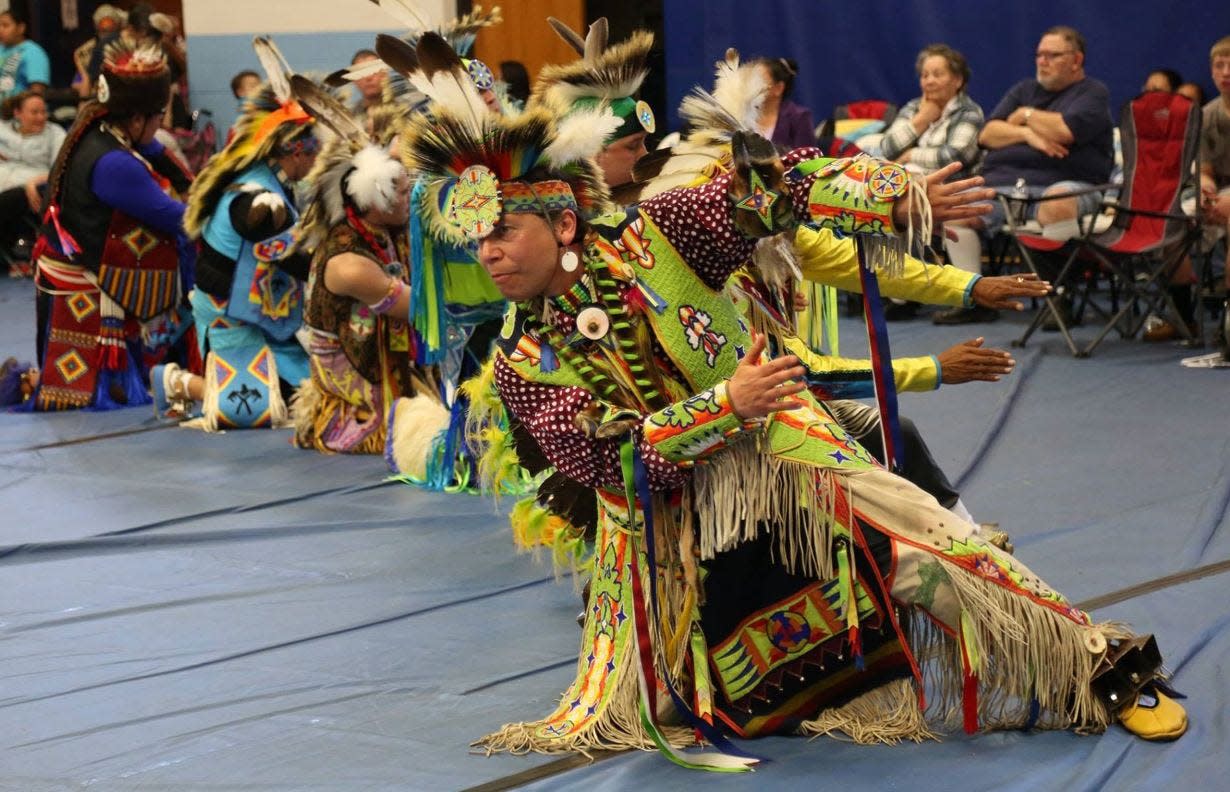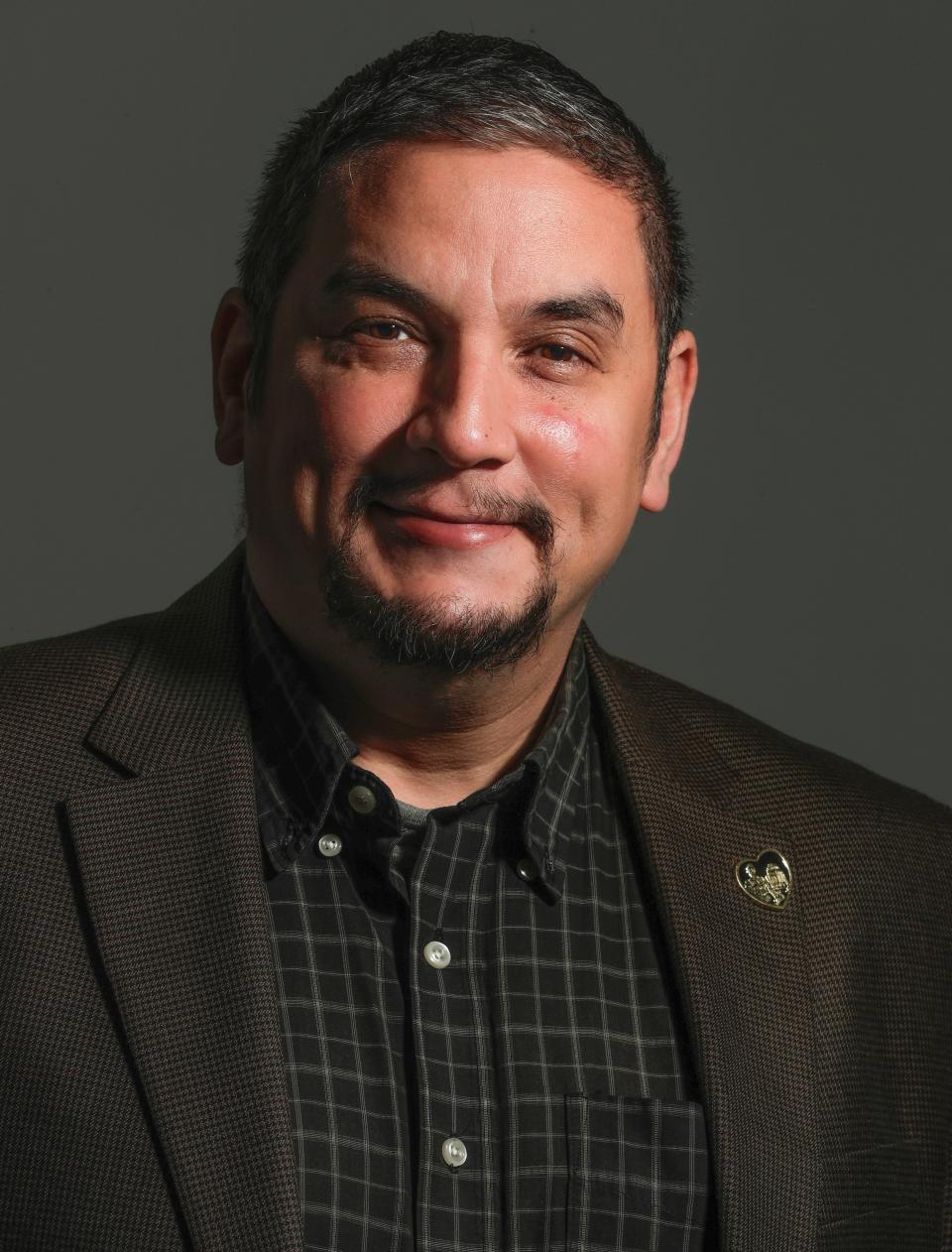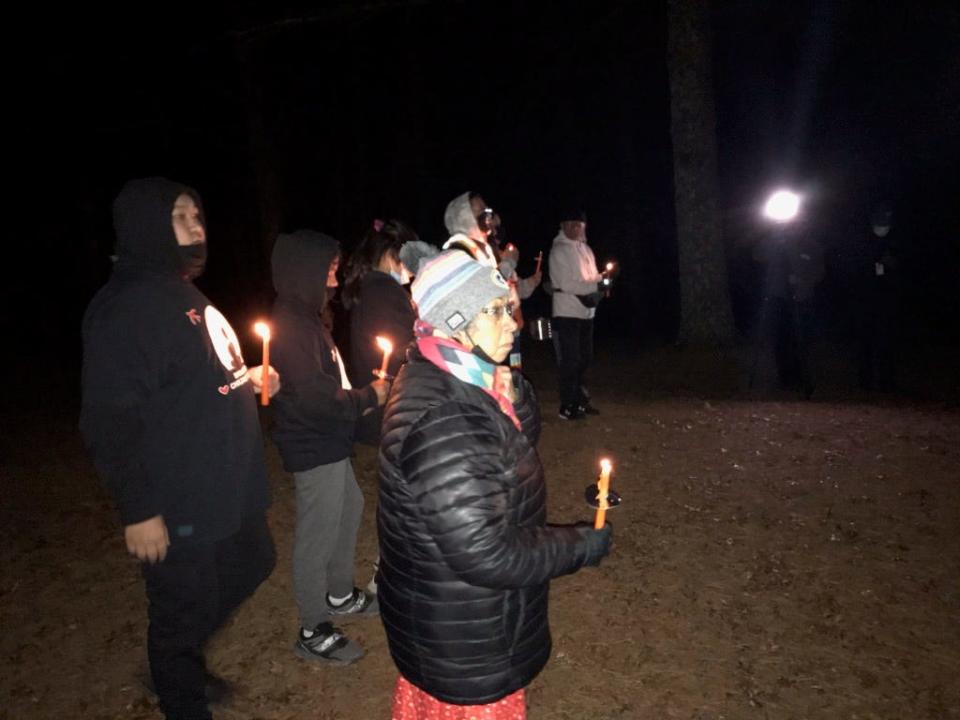His son died by suicide. He danced anyway. How generational trauma continues to haunt Native communities.

Friends of Marin Webster Denning told him he didn’t have to dance at the powwow weeks after his son’s suicide.
“These were the words and sentiments of true friends and family who carried love and compassion for us,” he wrote on a recent post on Facebook.
But Denning, in full traditional regalia, felt he did have to dance.
And not only because he had accepted tobacco, as per custom, to be the head dancer a year earlier.
It was April 17, 2016, at the Sturgeon Feast Pow Wow in Keshena on the Menominee Reservation. The gathering celebrated the return of the sturgeon in the Wolf River.
Webster, an enrolled member of the Oneida Nation in Wisconsin, knew hundreds of people would be watching him as he danced and he wanted to send them and himself a message that people should live what they represent and dance for people who cannot.
“One of Taylor’s last acts was to dance with me, the day before he left us,” he said. “He danced for me, for himself, knowing he would be ending his life hours afterwards. The least I could do was do what he did for me out of love. Dance.”
A little more than a month later, Taylor’s sister, Isabel, died by suicide as well. She was a Native jingle dress dancer who helped to heal others and was a student at UW-Madison.
Taylor's and Isabel's brother, Sawyer, died a year-and-a-half after Isabel's death from a drug overdose. He had worked at the Oneida One Stop convenience stores on the Oneida Reservation.
Native American suicide rates and drug overdoses continue to rise at alarming paces.
Native communities experience higher rates of suicide compared to all other racial and ethnic groups in the U.S., according to the National Indian Council on Aging.
For Native youth between the ages of 10 to 24, suicide is the second-leading cause of death with rates two-and-a-half times higher than the national average.
Suicide and/or drug use also has increased even more locally on the Menominee Reservation since the pandemic, according to tribal officials.
For the first half of last year, there were 70 drug overdoses on the Menominee Reservation with four overdose deaths.

Sign up for the First Nations Wisconsin newsletter Click here to get all of our Indigenous news coverage right in your inbox
Opioid deaths have been increasing statewide in Wisconsin the last 20 years, according to the Wisconsin Department of Health Services. In 2000, there were 111 opioid deaths. Twenty years later, in 2020, there were 1,226.
Between 2014 and 2020, Wisconsin had 6,845 drug overdose deaths with 5,338 coming from opioids and 3,101 coming from multiple drugs followed by heroin, cocaine and meth.
“The senseless deaths of young people is all around us from suicide, opioids, fentanyl and xylazine,” Denning said. “And now, it isn’t just the young people leaving us. The new numbers show those over 55 are rapidly growing because of the very same things affecting our young people.”
Generational trauma is a key contributor to higher rates of suicide, drug abuse and incarceration among Native American communities.

For Indigenous communities, advocates say many of the challenges that lead to suicide and addiction come from generational trauma.
From being forced onto reservations with little to no food, being forced to assimilate, and experiencing genocide and institutional racism, the result was Indigenous communities have experienced poorer health and poverty at much higher rates. That, in turn, leads to a decline in mental health and increase in suicide and substance abuse.
Thousands of Indigenous children from Wisconsin also attended boarding schools, some voluntarily and many involuntarily, starting in the late 19th century stretching well into the 20th century.
The schools stripped Native American children of their language, culture and customs. Youth were discouraged or forbidden from speaking their Native languages and forced to speak English. Their long hair, an important part of their identity and culture, was cut short. Their traditional clothing was replaced with uniforms.
Many youths reported physical and sexual abuse.
Today, American Indians are incarcerated at among the highest rates in Wisconsin, making up as many as half the inmates in some jails.
Indigenous-based programs, such as those offered by Wise Women Gathering Place in Oneida, try to address the issue by healing the root causes, which often includes reversing cultural disconnection and alienation and empowering a sense of pride in being Native without having to succumb to pressure to assimilate in the larger American society.
Denning is advocating for better mental health practices. And he is encouraging people to move beyond the stigma of dealing with mental health and address their loss.
It does no one any good to keep the pain hidden, he said.
“This is my way of saying there is something going on out there, and it started before COVID-19 and if we don't talk about it, get honest, and address it now, the situation will continue to grow,” he said.
“We must address systems not made for us, we must speak to power in our culture — our inability to stand in front of our own traditions and be willing to change for the new pressures of destruction," Denning added. "To not do so, is to disrespect the very life we have left.”
Where to get help
If you or someone you know is dealing with suicidal thoughts, call the National Suicide Prevention Lifeline at 988 or text "Hopeline" to the National Crisis Text Line at 741-741.
If you or someone you know is struggling with addiction, contact the Substance Abuse and Mental Health Service Administration's National Helpline at 1-800-662-HELP (4357) or TTY 1-800-487-4889. The helpline is a confidential, free, 24-hour-a-day, 365-day-a-year, information service, in English and Spanish, for individuals and family members facing mental and/or substance use disorders. This service provides referrals to local treatment facilities, support groups and community-based organizations. Also, visit the online treatment locator, or send your ZIP code via text message to 435748 (HELP4U) to find help near you.
Read more:
Potawatomi Library: This Wisconsin library remains a source of Native truth as libraries across the country ban books by Indigenous authors
Food sovereignty: At Bodwéwadmi Ktëgan, this Wisconsin tribe is using ‘circle of life’ techniques to feed its people. Here’s how.
Frank Vaisvilas is a Report for America corps member who covers Native American issues in Wisconsin based at the Green Bay Press-Gazette. Contact him at fvaisvilas@gannett.com or 815-260-2262. Follow him on Twitter at @vaisvilas_frank. You can directly support his work with a tax-deductible donation online at GreenBayPressGazette.com/RFA or by check made out to The GroundTruth Project with subject line Report for America Green Bay Press Gazette Campaign. Address: The GroundTruth Project, Lockbox Services, 9450 SW Gemini Drive, PMB 46837, Beaverton, Oregon 97008-7105.
This article originally appeared on Green Bay Press-Gazette: Native suicide, addiction, incarceration caused by generational trauma

